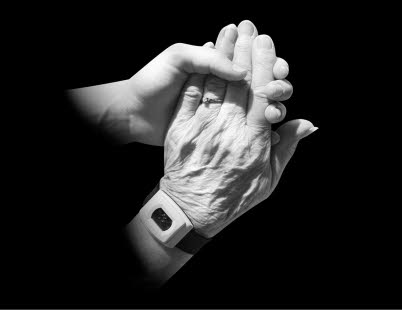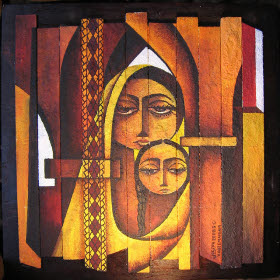by Jyothi Vinod
“Two one ja two, two two ja four…” It was mid-morning and the head of the Agarwal household was reciting the arithmetic tables for the benefit of his second grandson (and sixth grandchild), Sameer. The recipient, content in his six-month-old wisdom, not appreciative of this sing-song mathematical offering, cooed at the sky and trembling leaves, grabbing his big toe in chubby fists. The voice rode the February breeze, going as far as the ten tables. Then there was silence frilled with soft kitchen sounds and chirping sparrows.
Mrs. Agarwal, plump and extremely cheerful in disposition, looked at her third daughter-in-law who was stringing cluster beans. They said in unison, with comradely mischief, “Masterji has dozed.” Shefali put the beans aside and went out to check on Sameer who had let the big toe escape and was squinting at his feet, waving his hands hoping to catch the delicious toe again. She adjusted the rug over Mr. Agarwals’s knee and slowly moved the wheelchair so that the sun fell on his back. His head lolled to the left and saliva dribbled from the open mouth. She dabbed the white towel that he wore like a bib, to his lips and returned to the kitchen.
“Ma, are you visiting Roop Nagar this year?”
Mrs. Agarwal laughed,” You know how it is going anywhere with Papa. He gets agitated in a new place and keeps me dancing on my feet around him all day long. I don’t think it’s a good idea.”
*
Mr. Agarwal had been a tall handsome man of fifty when he returned from his printing press in the Old City one evening complaining of fever. Self-medication for a week, and he never stood on his feet again. Mrs. Agarwal and her eldest son, Ram, had spent a whole year visiting doctors and specialists across the country before accepting the sad truth.
Whether scientists research this aspect or ignore it, strange viruses do meddle with the psyche of a person, altering cheerful, independent people into selfish, complaining monsters. However you reason this out, the care giver finds days long and thankless, with the years dragging along endlessly, no hope in sight.
Mr. Agarwal had been a disappointment to his father who couldn’t figure out why his first born would rather be a school teacher than enter the family’s lucrative jewellery business. With five younger sons waiting impatiently to enter the family business, Mr. Agarwal’s father conceded a little, setting up the ‘Ram Lakhan Printing Press’ in Jaipur’s Old City precincts advising, “This is better than teaching. You will be printing the books which poor masterjis need.”
Mr. Agarwal married Parvati and settling down in Jaipur, he enjoyed working in the printing press. He deliberately named his first and second sons, Ram and Lakshman. History repeated when his grown-up sons scoffed the ‘messy ink and paper’ business for the lucre of diamonds, and jumped into business with their uncles. They now flourished abroad. Bharat, the youngest, liked the idea of the printing press and took charge.
“It’s not hereditary, this pr…problem with Papa,” Mrs. Agarwal had told the young Shefali. Adjusting her glasses thoughtfully, Shefali had replied, “I am sure it isn’t.” They were alone in the kitchen in Shefali’s home in Jodhpur. Shefali had agreed to marry Bharat a few minutes ago and her parents had gone to fetch their family priest to solemnise a small agreement ceremony. When Bharat had sauntered into the kitchen a little while later, the three of them realised they were going to be happy together.
Mrs. Agarwal cheered up considerably after Shefali’s arrival and they secretly referred to Papa as masterji. ”We are not being disrespectful, Ma. Our sad and depressed faces are not going to cure Papa. We have lives to lead. We didn’t create the virus, and anyway, he always loved to be a teacher. So no harm,” she reassured Mrs. Agarwal.
Shefali was quick to notice that Papa liked having his wife at his beck and call. Years of immobility had weakened his limbs, and though Gopal, their trusted help was always around, “Parrooo, Parroooo….”, he slurred, growing angry and petulant at the slightest delay. Twenty years of living with a husband who was a caricature of his former self had not sapped Parvati’s spirits. She enjoyed the love and company of her grandsons: three year-old Shrey and baby, Sameer.
Bharat’s idea of pure bliss was a holiday coinciding with a cricket match. Mr. Agarwal, never having enjoyed them in his healthier days, joined Bharat in the living room, infected by the enthusiasm, the noise and commentary. Grabbing the opportunity the distraction provided on such days, Shefali encouraged Mrs. Agarwal to accompany her to the nearby vegetable market and temple. There, in those aging eyes she saw a sparkle again. She wished she had the power to undo the illness that had made her in-laws prisoners unto themselves. Two harmless people who would have aged peacefully enjoying conversation and walks together, now lay bound by a sense of need and duty. She knew Mr. Agarwal had been extremely considerate with people around him. It was hard for him as well – the irreplaceable loss of 20 healthy years.
Mrs. Agarwal’s hometown celebrated Gangaur with religious fervour. Celebrated in March, it is devoted to Lord Shiva’s consort Gauri. Her four sisters had started this tradition ten years ago; meeting in Jodhpur during the festival with their families, staying in their maternal home in Roop Nagar, gossiping into the night, and strolling through the town recalling old times. Mrs. Agarwal’s eyes shone when she described her childhood to Shefali. The ghewar from ‘Nathuram Sweets’ was the best in the world, she would say, swallowing hard, almost tasting it again. Twice she had taken Papa along, at her sisters’ insistence. Going by the experience, her sisters didn’t force her again.
*
It was Shefali’s idea. With Bharat and Gopal, she would manage wonderfully. Mrs. Agarwal would have her ten days of undisturbed pleasure this year. When Shefali proposed the idea in late February, Mr. Agarwal nodded – it was only for ten days.
When Mr. Agarwal took his naps, Shefali and Mrs. Agarwal packed clothes. They bought gifts and clothes for the sisters. Bharat was a little worried at their schoolgirl enthusiasm.
Even as the days of fasting for Gangaur began after Holi, they observed Papa growing restless. He found more reason to call out for his wife and complained of aches and discomforts. ”Don’t go,” he finally said. To which his wife replied, her lips quivering, “Why don’t you come too? I can’t cancel now.”
Shefali chopped the spinach with murderous chops, “Ma? Why? We can take care of Papa for ten days. Don’t you trust me? Go alone and enjoy with your sisters.” Sighing like the deflating roti in the casserole, Mrs. Agarwal rolled out another.
*
Mr. Agarwal was dressed warmly for the travel. Gopal was to accompany them in the taxi leaving at 12 noon. A cricket match was on and Bharat was yelling, “Call the third umpire. Sachin is not out!” There was a pause while the decision was being taken with action replays. Shefali served piping hot tea. She stepped quickly across Bharat’s legs not to obscure his view and walked towards Mr. Agarwal. There was a single cup of tea in the tray when she stepped on the walking stick and the tea found its way to the old man’s hands and chest.
Mr. Agrawal was startled. Bharat wheeled him to the bathroom and she took Gopal’s help in bathing the reddening hand. She stroked her father-in-law’s arm saying softly, ”Papa, how careless of me. Please forgive me.” He was shaken and whimpered like a small child. Bharat rushed back to check the verdict of the third umpire. And a taxi honked impatiently.
“Bharat, let Ma go to Jodhpur alone. These burns may become infected in the dust and heat,” Shefali said firmly, pushing Mrs. Agarwal to the waiting taxi whispering, “Go , go. Trust me.” They waved till the taxi turned the bend.
*
“Yes Ma, Papa is fine. He is cheerful and has forgotten you already. Of course! The scald on his hand is mild. One or two days of ointment will do the trick. Most of the tea fell on his thick coat. Enjoy yourself and bring us the delicious ghewar.”
“Papa, Ma is missing you very much and wishes you were with her. Tomorrow we’ll take you to Nehru Park. I hear the roses are in full bloom,” Shefali said as she spooned the last of the dal into his mouth, wiped his lips and called out, “Bharat, you can feed Papa some curd now.”
Then they wheeled him into the living room to catch the news before Gopal would tuck his master into bed.
Switching off the kitchen lights for the night, Shefali paused, lost in thought.
Thank God. There is no third umpire in the house!






